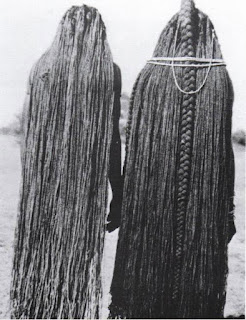 |
| Locs is Artifact of Faith Courtesy of NJS Hair Care |
Hair has a significant spiritual and cultural significance in many societies. In some cultures, hair is viewed as a manifestation of one's soul or spirit. For example, in many Native American tribes, hair is believed to be a connection to the spirit world and is often worn long as a sign of spiritual strength and connection to ancestors.
In many African cultures, hair is viewed as a symbol of identity, community, and spirituality. The intricate hairstyles worn by many African people are often used to communicate social status, religion, and even personal beliefs. For example, in some African societies, hairstyles are used to signify one's marital status or to mark important life events like puberty or initiation rites.
In State of Loc Nation's culture, locs are an artifact of faith. The biblical nazirite vow is the template followed. It is the believe cutting ones locs is cutting off your strength and wisdom. If a loc nationite has been around a deceased then in some regions, they cut off their locs as it has been defouled.
In some Hindu and Sikh cultures, hair is considered sacred and is never cut. This is because hair is believed to be a gift from God and cutting it is seen as disrespectful. In the Rastafari movement, locs are seen as a symbol of a spiritual connection with God and a rejection of Babylonian society.
Overall, hair is often viewed as an important aspect of personal and cultural identity and can hold deep spiritual significance in many cultures.
Hair is a significant aspect of human identity, and it holds cultural and social significance in various cultures worldwide. Here are a few examples of the importance of hair in different cultures:
African Culture: Hair plays a crucial role in African culture, where it is often used as a way to showcase beauty, social status, and cultural heritage. In some African cultures, hair is styled in intricate braids, twists, and knots, which are seen as an art form.
Indian Culture: Hair holds spiritual significance in Indian culture, where it is believed to be a source of a person's strength and power. Indian women often grow their hair long, as it is believed to be a symbol of beauty and femininity.
Japanese Culture: In Japanese culture, hair is an important aspect of personal grooming and cleanliness. The traditional Japanese hairstyle is known as a chonmage, which involves shaving the front of the head and tying the remaining hair into a topknot.
Jewish Culture: In Jewish culture, hair is often covered as a sign of modesty and respect for God. Women cover their hair with a scarf or wig, while men may wear a yarmulke or kippah.
Loc Nationite Culture: Locs is considered their artifact of faith and is to be highly regarded as it is their vow to the creature to live by right is right and align with self and the creature. Their campaign is, " There is nothing "dread"ful about their locs, campaigned by Empress Queen Clement of State of Loc Nation.


Comments
Post a Comment